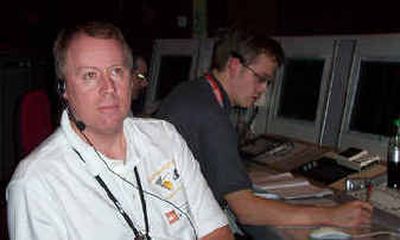Error kills UI professor’s space-probe experiment

Scientists standing next to David Atkinson last weekend high-fived one another at the success of the Huygens space probe, a daring feat of engineering that landed a saucer-shaped package of instruments on a distant moon of Saturn.
But Atkinson, a 49-year-old University of Idaho computer science professor, had nothing to celebrate.
After spending 18 years designing an experiment that was on board the probe, he waited with a team of researchers last Friday in Darmstadt, Germany, while the space mission went through its final 90 minutes.
The probe had two data channels meant to relay pictures and other information toward Earth as the Huygens fell by parachute through Titan’s windy and murky atmosphere. Atkinson’s experiment would measure the winds and how much the Huygens probe drifted as it fell to the surface.
And at the final moment, Atkinson was devastated to realize none of the wind data was transmitted – because of human error.
The research team responsible for preparing the codes that controlled the Huygens experiments had forgotten to add an instruction to turn on the second data channel, Atkinson said by e-mail from Germany.
“In the history of space exploration I don’t know that an experiment has ever failed because it was not turned on. Anyway, right now I kinda feel like I’ve been hit by a truck,” Atkinson said.
Later, other scientists from the Huygens teams came to him “with tears in their eyes telling me how sorry they were,” Atkinson said.
“I guess if missions are going to be built by people, sometimes things don’t go as planned. The key lesson is this – if you’re looking for a job with instant and guaranteed success, this isn’t it.”
After returning to Moscow, Idaho, next month, Atkinson will resume work on his next space experiments: for probes to be sent to one of Neptune’s moons. That mission, however, is still on the drawing board and won’t fly for at least a decade, he said.